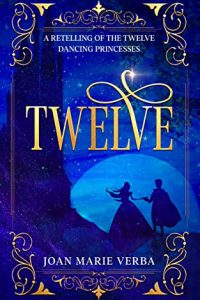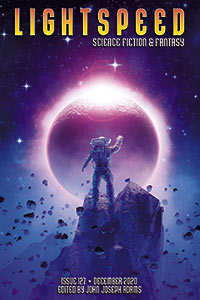Lois Tilton reviews Short Fiction, early December
Here’s a miscellaneous batch of zines.
Publications Reviewed
- Interzone, Nov-Dec 2011
- Clarkesworld, December 2011
- Alt Hist #3
- Redstone Science Fiction, December 2011
- GigaNotoSaurus, December 2011
- Jabberwocky #8, July 2011
- Jabberwocky #9, October 2011
- Apex Magazine, December 2011
Interzone #237, Nov-Dec 2011
Only four pieces of fiction in this issue, probably owing to the length of the Hawkins story. It is a much more literary, less skiffy collection of stories than usual for this zine. I’m not sure this is a Good Thing.
“The Last Osama” by Lavie Tidhar
A fiction closely related to the author’s novel Osama, although it seems more to be a variation than an outtake. Tidhar seems to be reworking the material of terrorist/revolutionaries in a large number of different works. Like the novel, it is a metafiction. There are multiple points of view. Most of the text is narrated by a bounty hunter named “Mike Longshott”, a bounty hunter of Osamas. But in other sections, an author/narrator of the novel informs us that Longshott does not really exist. And in yet other sections, another narrator who may or may not be Tidhar [who claims to be dead, like Osama] speaks of his personal experience with terrorist activity.
The subject is the asymmetric warfare we have known for the last few decades, but more specifically the notion of the iconic figures involved in such wars. According to Longshott, when he shot Osama bin Laden in Abbottabad,
“He exploded not in blood and bones and brain but like a pillow, bursting open. It was silent. Things that were not feathers came out of him. He disintegrated as I watched, helpless.”
They were spores, each one capable of growing into a new Osama. Here is a theme that Tidhar has dealt with before, with similar iconic characters such as Che Guevara. “Osama” had become something other than an individual living man but an icon, a symbol, an archetype, a character either idealized or demonized. And such characters cannot be killed; they live on, multiplying as long as they are remembered. In the quest to destroy them, we immortalize them.
Kill the man and all you do is preserve the image of the man. His Ikon. Kill a man and a thousand spores of faith and belief, a thousand spores of ideas erupt into the world.
There is no way this one can be understood outside the context of the novel that, in whatever way, gave birth to it, of which it is an alternate version. But there is more to it. Tidhar says that we are all Osamas, each in our own way. But he also brings us back into our own history, and he makes his own Israeliness a factor in the story, his own [real or fictional] experiences with terror attacks, both on the dealing and receiving ends. These are notions well worth contemplating.
“Erasing the Concept of Sex from a Photobooth” by Douglas Lain
Art. So-called. When Allan and his wife fuck in a photobooth, they change the world. Maybe. As they engage in the act, the machine disgorges over a hundred sets of photos that might have come from the past or from some alternate reality. Allan decides to cover them in black paint, because that’s what he does, and this is the more likely explanation of the changes he notices in current reality.
This arty, pretentious, absurd fantasy is not at all to my taste.
“Insect Joy” by Caspian Gray
Coming down to the personal level in this more conventional fantasy. Amy’s paraplegic husband, recently wounded in Afghanistan, suspects correctly that she would rather spend time with her dog than him. But then Amy has the gift of hearing what animals think, down to the crickets in the pet store where she works. Matters come to a head when they discover that Amy’s gift is more powerful than she had supposed.
It’s a story of sacrifice, particularly the kind of sacrifice you don’t want to make. The ending is tragic, but we don’t know exactly how far it extends, and that fact is chilling.
“Digital Rites” by Jim Hawkins
Here at last is the kind of future skiffy adventure I associate with IZ. We have a movie company heavily invested in digitized performers, linked in quantum entanglement to the brains of their physical models. Someone begins to kill the biological actors and the head of the company correctly suspects corporate sabotage. But who? How? And how can they be stopped? And how can they recoup their investment in the current movie?
This is a neat adventure thriller, lively and vivid, with a large cast of interesting characters that includes the movie people and the local police on Corfu, where the first deaths took place.
“When the top executives of a film company fly in overnight and start spending big money, I have to think that they’ve got something to hide. I was at the post-mortem and the pathologist said there were some anomalies in the brains of the dead girls. So an alternative hypothesis has to be that you did something to them which went terribly wrong.”
If I have any complaint about this one, it’s that the last question is answered in a rather predictable, facile way. The rest is a good, exciting read.
Clarkesworld, December 2011
Reading the Valente serial and this month’s shorter works.
“Silently, and Very Fast” by Catherynne M Valente
Regular readers of this column [if such exist] will be aware that I rarely review serialized fiction, which makes me cranky. For one thing, the complete work usually turns out to be novel-length, not to be short fiction. And I don’t like to wait to finish reading a story, or to click through installments. So when I saw that this one was going to be serialized [in three parts, no less!], it made me cranky. And worse, it was a reprint! Even worse, there weren’t even any links between installments! But my dark and shriveled critical heart has a soft spot for certain authors who produce consistently superior fiction.
Immediately, I get a sense of deja vu. It begins with the same epigraph that Ken Liu used earlier this year. And the same Inanna myth covered just recently by Yoon Ha Lee in this very zine. It turns out to be one of those stories done in several parts, the connections between which are often left to the reader to discover. The narrator is an AI named Elefsis, created long ago by an architect as a house automation. Things are now different and Elefsis has been passed on to Cassian’s heirs, where they live in a dreamworld.
I programmed myself to respond to Ceno. She programmed herself to respond to me. We ran our code on each other. She was my compiler. I was hers. It was a process of interiority, circling inward toward each other. Her self-programming was chemical. Mine was computational. It was a draw.
But with each transfer Elefsis loses something of himself as well as the connection with someone he has so intimately loved. And they keep things from him. He wants to know why he is bonded to Neva instead of her brother Ravan. He wants to know why he can’t upload to other machine intelligences. Until he discovers the secret, which is devastating.
The story is about the relationship between humanity and its created children, and love, and death, and self. That’s a lot. The narrative of Elefsis alternates with myths and fairy tales to illustrate these problems, but the reader will also hear the primal voice of Asimov, from whom many of them have sprung. Except that Asimov could never write like this.
–RECOMMENDED
“Sirius” by Ben Peek
Contamination. A human colony on a planet gifted to them by an apparently benevolent alien race, with a space station in orbit. A disease that begins with a single human and spreads rapidly, regardless of precautions. The story is told by a succession of victims, some of whom seem to be dead as they compose their message, illustrating the variety of responses to the growing crisis – some selfless, some otherwise. The conclusion adds an explanation, but I find it a bit disappointing, as distracting from the original premise.
“In Which Faster-Than-Light Travel Solves All Our Problems” by Chris Stabback
The narrator is a solitary and misanthropic space freighter.
I live in my cockpit. I piss in a bottle and I cross the vastest vastness in my shining tin can. I’ve seen more of nothing than just about anyone, but if I’m telling you about it then you aren’t really here, because it’s just me out here.
At a pickup point, the narrator reluctantly takes in a talkative castaway who seems convinced that he is an alien. He hopes to get rid of the passenger as soon as possible.
A story about the hazards of human isolation. With a twist at the end. Ironic.
Alt Hist #3
This magazine of historical fiction, factual and alternate, is settling into a semiannual schedule with five stories per issue.
“A Light in the Darkness” by Ian Sales
The figure of Nikola Tesla is one of the great attractors of historical science fiction, and the potential stories based on his theories would seem to be limitless. Here we have Tesla actualizing his theory of stratospheric transmission, in which high-tension currents beamed up to the stratosphere would illuminate the sky. It is significant that the timeline begins in March, 1917, before the US entered WWI, for the military control over such experiments in wartime would not have permitted such unregulated experiments.
The story is told from three alternating points of view. The author successfully captures the eccentric genius of Tesla, and his scenes on the front in WWI France are effective, using Wilfred Owen as the focal character.
The trench is six feet deep but already two feet of water fill the bottom. A cold clinging mud oozes from the shored sides, quickly soaking the uniform of any soldier exhausted enough to lean against it. It is late afternoon and the sky above is a deep clear blue. The sun is shining, yet there is a coldness which strikes at the bones with the sharpness of shrapnel.
The conjunction of these two threads is striking. Unfortunately, there is the third narrator from some point in the future of these events, a person under interrogation and torture for reasons that readers do not understand because the character does not. These scenes are in the story because the author does not trust his readers to grasp the connection without being led by the hand. It would have been better without them.
“Dublin Can Be Heaven” by Séamus Sweeney
In post WWII Dublin, a former Serbian partisan known as Harry hunts his Croatian target, not entirely unhappy that the search is keeping him in Ireland.
Now Dublin was food, Dublin was breakfast, Dublin was lunch, Dublin was dinner. Also, Dublin was no ration cards, and no queuing. Every morning he ate slowly, relishing the sensation of gradually filling up. As he chewed he looked out at the street, or over towards the Liffey. How different all this was from those months before coming to Dublin, cadging coupons from the rest of the Balkan flotsam and jetsam that ended up in London, being ignored by the Foreign Office.
A short alternate history that is mostly fact, based on the career of Andrija Artukovi?, a high-ranking figure in the Ustaše who was known as the “Himmler of the Balkans.” He did, indeed, come to Ireland after the end of the war. The story is not concerned with consequences but rather with the character of “Harry,” the man sent to take revenge. As such, readers might find it a bit cursory.
“Riders on the Storm” by Arlan Andrews
Larro and his friends are Time-Riders from the 21st century, which is to say virtual death tourists. This time, they are riding the bodies of soldiers in the American Civil War, and enjoying the trip. Until things go wrong.
The best Rides are when you die, and you also get to peek over at the Over. It is sweet; it can be fun. That’s why sites like Pompeii and Hiroshima and Teheran are so popular: no matter who you randomly Ride, they all die in the end, some of them real quick. Lots of Over-seeing in those places.
The use of The Doors’ title has to be a deliberate choice, but I find it distracting. What’s interesting here is the contrast between Larro’s shallow and self-centered mindset and Johnny’s outlook, God-fearing yet, as we discover, no less self-centered. The conclusion is apt.
“Bummers” by Matthew Warner
On Sherman’s march of pillage to the sea. Frances joined the Union Army as a man after her lover Emma ran off with a plantation owner who was pimping her nude photograph to horny soldiers. Then her squad marches onto the plantation where Emma lives.
And yet I did want to see her, didn’t I? Wanted to show her I didn’t need her no more. Wanted to see how her Mister McCombs had treated her like a common ragamuffin and a whore, not like an honoured Southern belle. I wanted her thin and sickly, not a tooth in her head, rode hard and put out wet.
The presence of women in the armies of the Civil War is well-attested. This one is straight historical fiction illustrating some of the difficulties such soldiers faced in that company, always aware of the risk of rape and worse if they were discovered. I’m not sure why the editor found this fact remarkable.
“To the Stars” by Brooks Rexroat
Another title with dissonant associations that may strike some veteran readers. Gigory Novakov is a cosmonaut in the early Soviet Vostok space program. His wife and son get to watch his flights on television and participate in posed and scripted propaganda films, always careful to watch everything they say, in case they are under surveillance.
There are footsteps at the door, but no one knocks. Yulya and Anton do not flinch—it is just the sound of soldiers changing shifts. There is always a man with a gun outside the Novakov flat—two or more on days preceding a launch.
This is another straight historical fiction, a past dystopia. The atmosphere of surveillance and suspicion is strongly oppressive, but also the sense that the characters love each other; consequently, I have a hard time accepting what Yulya does.
Redstone Science Fiction, December 2011
A couple of stories about marriage, one bad and one good. That is, both the marriages and the stories. In both, the SFnal aspect is something vague in the background.
“Hacker” by Siobhan Shier
The narrator has reprogrammed her husband. It was wrong. She knows it was wrong. But she’s a selfish bitch and does it anyway.
But it couldn’t be helped. I would do anything to keep the man I married – the man I turned him into. He never would have made it through the backstabbing ranks of the Elantic corporation if it wasn’t for me.
It’s quite possible, of course, to have a good story about a disagreeable character, but there is nothing original here, and the prose is awkward and graceless.
“Time, Like Blood on My Hands” by Eric Del Carlo
Dolores still lived in our house, but I hadn’t seen her in years. We all use that nicety. I haven’t seen so-and-so in years. Everybody knows what it means; no one will press further.
This is because of the Fracture, which separated people into different time tiers, into parallel lives that never touch. Sid was married to Dolores and carries on his life without her, even sometimes dating other women. But he can’t quite let go.
The premise of people living in parallel time tracks isn’t new, but the author handles it well in creating a story of a man who still loves the wife from whom he is separated. A love story tinged with sadness.
GigaNotoSaurus, December 2011
“The House of Aunts” by Zen Cho
The aunts are all dead, or rather undead, as is Ah Lee. They all eat human flesh, cooked properly with ginger, but Ah Lee being only seventeen still has to go to school and be subject to the harassment of her elders, just like any living girl. They read her diary and find out about the boy in her class that she likes.
She could just picture Ji Ee and Aunty Girl reading it out, translating the English and Malay to Hokkien as they went along for the benefit of Ah Chor and Ah Ma and Sa Ee Poh, who could not read. The aunts’ conception of the right to privacy went far enough to allow you to close the toilet door when you were peeing, but no further.
Love the title. The place of overbearing aunts in literature is a long-honored one, and this does not disappoint. At its heart a warmhearted, humorous story of family love. With entrails. The author makes good use of the Malayan setting and legend, and it’s neat to see the cultural and language differences between Ah Lee and Rizdual, from a very different background.
Jabberwocky #8 July, #9 October 2011
The link to this little zine got caught in my all-devouring spam filter, so I missed the previous issue. Forthcoming issues will be under the sole editorial control of Erzebet Yellowboy, as Sean Wallace has consolidated his publishing activities. She writes, “I am constantly not seeing enough poetry disguised as prose, I am not seeing fiction that is too weirdly structured, or too wordy.” The guidelines are unclear on opacity and, alas, express a preference for very short works. Nonetheless, they remind me rather of what Wallace’s Fantasy Magazine used to be in its earlier days.
“Boy of Grasses” by Christian K Martinez
The narrator calls himself a magic man, and his gift is with plants, with the green. He knows what he wants and goes after it.
I want a woman with strong wine in her cask, a plant and tree that blossom in the moon and bend to shiver light from branches. I’m young, twelve and a score, but I’ll have her. Just you see. Though that idn’t for now.
Quite short, rather unoriginal. Readers may be curious about the brew in the witch’s cask, but the story doesn’t say.
“The House of Unrighteous Images” by Megan Arkenberg
The House is a prison for subversive paintings where they are executed and fed to the furnace flames.
A great majority, however, are guilty of minor crimes. They are not enthusiastic enough in their portrayal of life in the shadow of the Empress, steel-bright and singing like engines, or they bear and unfortunate resemblance to a man or woman or aesthetic that has fallen out of favor. Some simply hung in the wrong place, over the wrong table or the wrong bed.
Amelia Valens, who once wanted to be a painter, is now, reluctantly, a guard in the House, where a certain painting seems to have a strong attraction to her.
Nicely-done dystopian fantasy in which paintings have transformative powers. Sinister, and faintly surreal; it is not certain if the artists create the paintings, or the other way around.
“The Woods, Their Hearts, My Blood” by Mari Ness
The narrator has made an unholy bargain and she must eat the hearts of seven of her daughters in order to gain a witch’s power. She wonders sometimes if it is worth it. The reader doesn’t wonder.
In fairy tales, it is easy enough to have seven daughters.
In fairy tales, it is easy enough to kill them.
In fairy tales, there is usually some specific goal to be won by such acts. Revenge, perhaps. Or saving some beloved life. Here, the narrator speaks vaguely of an evil to be combated, but that isn’t enough. She speaks of necessity, but we don’t see it. The case is not made strongly enough for this to work.
“Corpse from a Swan” by Erik Amundsen
A girl’s corpse is washed ashore, and the musicians are ready to fight over the body, from which they intend to make enchanted instruments.
Neither of them was going to say so, not after the Harper cast his scorn upon the notion, but she did look about as much like a swan as she did a corpse. A swan that had long hair to match the color of the gold ring on her middle finger. There was no swelling, no rot, no smell but for an odor only detectable to a certain class of sharp-nosed minstrel.
Wickedly clever.
Apex Magazine, December 2011
Not happy to see from the editorial that the maximum word length will be reduced from now on.
“The 24 Hour Brother” by Christopher Barzak
A strange and sad fantasy of children whose lives are like mayflies. Lewis at age fifteen is ready to be a big brother to newborn Joe, but he doesn’t really have a chance.
I turned back to Joe and stroked my fingers against his cheek like I’d done after he was born that morning. I thought about stop signs, red lights, crossing guards with whistles. Slow down, I thought. Slow down already.
A moving story that reminds me of the plight of children with progeria. It’s an odd thing about fantasy, that readers can accept the totally impossible, yet stumble over the merely unlikely. So I can’t really accept that Lewis would have been allowed in the delivery room while his mother gave birth.
“Faithful City” by Michael Pevzner
In a dystopian future there is a City that sometimes calls the worthy to it. The narrator is called in a dream and guided by an inner orchestra. But when he passes through the gates of the City, something seems to be wrong. No one is there. And he has a strong impulse to divest himself of his flesh. Either the City is a deadly trap, or the paradise he has always believed in.
When I read this month’s editorial, I wasn’t happy with the announcement that the word length would be reduced, as the editor says she prefers “leaner, tighter stories.” Yet I must admit that this one would be much better if it were leaner and tighter. And shorter.







Pingback:Lois Tilton reviews Short Fiction, early December – Locus Online | Official WebSite Of Nikola Tesla
Pingback:Alt review « It Doesn't Have To Be Right…
Pingback:Locus Online Early December 2011 « Panglossian Hubris